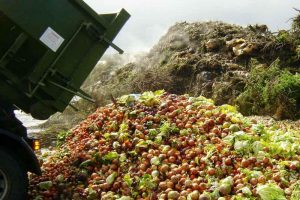For our group action project my group tackled the problems of food waste. Food waste starts at on the farm, where almost 7% (est 1.3 billion pounds/year which is about 1 trillion dollars in lost food/year) of all food that is grown goes unharvested (Foodtank). Next it is transported to markets, where it may go bad during transportation or while in storage. The third stage of food waste is the market itself, where a large amount of food gets thrown out / not sold. The final stage is of course in our homes, where we let food go bad before we cook it, or cook too much and throw it out. The Food and Agriculture Organization (FAO) found that “54 percent of global food wastage occurs during production, post-harvest handling and storage, and 46 percent at the processing, distribution and consumption stages”( FAO, Food Waste Worsens). The general trend noted by the is that developing countries lose the most food during production and storage stages (due to a lack of technology and infrastructure) while developed countries have waste the most in the consumption stages. High-income countries discard up to 30 percent of fruits and vegetables alone in the home (Foodtank). Why is this a problem? Because “just one quarter of all wasted food could feed the 795 million undernourished people around the world who suffer from hunger” and because food waste (Foodtank). To quote Michael Carolan: “Here is a thought: why not just use what we already use?” (Carolan 126)

So what did we do? An article describing a student at Stanford who had created an app to coordinate places with extra food and food banks inspired me to tackle this problem in Seattle. Our group originally wanted to create a booth at the farmers market to collect donate and leftover food to bring to the local food banks. However, the local farmers markets wanted nothing to do with us. Next we tried to do a similar booth with educational games and information at the University Avenue street fair, but booths cost minimally 500$. We finally decided to make a video that could educate people about the issue of food waste, what they could do, and what specifically UW was doing. We interviewed five people: Professor Sally Brown, Professor Karen Litfin, a representative from the UW farm, a rep from Imperfect Produce, and a rep from UW dining. We asked them each five questions, which we cut into a ten-minute video. Check it out: (https://www.youtube.com/watch?v=cAPDmRUX5OE&feature=youtu.be)
Over the course of this project we ran into many road bumps but I think overcoming those hurdles were what ended up teaching us the most. The whole group was great and willing to help every step along the way. I learned that I am creative, adaptable, assertive, and willing to take on a leadership position. I also learned that I do not have a future in filming or the patience for video editing and producing. I spent hours trying to find usable footage and make transitions smooth, adding in and lining up the seperate audio files, adding slides, and adding name tags into the video. It was also really helpful to be flexible and creative to adapt well to the curve balls that were thrown at us. It was also helpful when we were forced to create a schedule for the group proposal; sticking to that schedule really helped us common in ahead of the deadline. It was also imperative we started early because it was so hard contacting, getting responses from, and organizing time to film all the people we interviewed. Everyone was willing to step up and willing to change directions reducing a lot of the possible stress such a large and vague project could create. Action is hard, collective action can be so much harder, but with a group of ladies as motivated as we were, it would have been hard to stop us.
Also Check out these cool companies tackling food waste:
1)https://www.foodnetwork.com/fn-dish/news/2018/4/cool-ways-companies-are-reducing-food-waste
2)https://www.youtube.com/watch?v=Z5WgV-r2dgk
3)https://www.triplepundit.com/2015/04/3p-weekend-10-companies-that-are-rethinking-food-waste/
4)https://www.imperfectproduce.com/ and their blog: http://blog.imperfectproduce.com/
Citations:
Carolan, Michael. The Real Cost of Cheap Food. Routledge, 2018.
Gaeta, Ana-Christina, et al. “10 Facts You Might Not Know About Food Waste.” Food Tank, Food Tank, 13 Nov. 2016, foodtank.com/news/2015/06/world-environment-day-10-facts-about-food-waste-from-bcfn/.
ReFED, A Roadmap to Reduce U.S. Food Waste by 20 Percent (2016),https://www.refed.com/downloads/ReFED_Report_2016.pdf.
( FAO, Food Waste Worsens) Food Waste Worsens Greenhouse Gas Emissions: FAO.” Climate Central, 22 Sept. 2013, www.climatecentral.org/news/food-waste-worsens-greenhouse-gas-emissions-fao-16498.
Image courtesy of: http://radiowest.kuer.org/post/worlds-food-waste-problem
